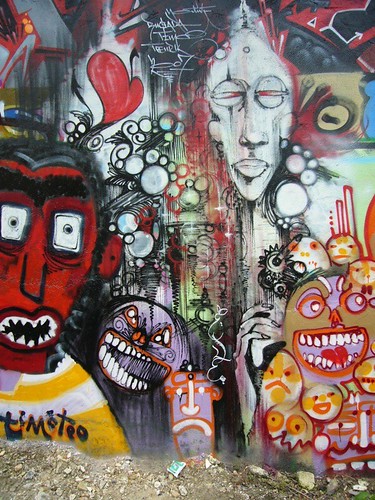Category: "Anthropological notes"
19/09/12
Preparing for the defence: Areas of weakness

Exploring the drinking fountains at Forum Romanum at 23 January 2012, at the day my thesis was finished printed and handed in to the department of social anthropology, and one day before I turned 40
The project and the PhD are now completed. In order to also wrap up this research blog, I’ll see if I can find the time to conclude a couple of unfinished posts as well as finishing it all with a description of the defence, or viva, itself. As this blog has followed me all the way from Ménilmontant, 8 October 2005, it feels right to do it this way. At the same time, I feel a bit in a hurry to conclude all this now, as I’m so eager to get on with other things, many of them of course related to this large project.
11/04/11
Pieces into place: Décroissance, another life and another politics – And making sense of the data
(Writing is progressing so fast now, that I’m not able to keep up here. This post I wrote several weeks ago, but haven’t found a free moment to post it before now. I’ll try to find some more time to keep up the blog in this final stage, as it would be good to document this part of the project as well. I’ll see what I can manage.)
Smaller and larger parts of the puzzle find their place at the moment. Phenomena that have only flickered past my attention in a superficial, disconnected manner suddenly add up to a larger picture.
21/09/10
Presentation presence - and Catania!
04/09/10
What is it with Paris?
“I can see right away if people are from Paris or from the suburbs,” said a playground & park warden to me. “It’s a different mentality, and they behave and move differently. People from Paris are proud of their city.”
27/07/10
Balance
A little red robin just whistled outside the bedroom window. My son takes his midday nap in my lap this summer. For a long time now, he has let us know that midday laps are a waste of time, and the only way to get him to sleep is to make the environment as boring, but cosy as possible. I bunk up with a cup of tea and a novel or a pencil and paper, and for an hour or so I can slouch peacefully in the bedroom in the middle of the day.
20/05/10
What is it that I’m studying “the making of…”?
For a long time, the preliminary title of my research project was communities in the making… I was thinking of Britain and France as the two communities that were in a constant state of creation and recreation. Then I realised how flawed this title was. First of all, many misunderstood what I meant by “community”, thinking that I had such an old-fashioned perspective on society as consisting of different (“ethnic” or whatever) “communities” that were reproducing themselves. (Perhaps I lost a PhD scholarship that way). Second, I finally realised that it wasn’t strange that people misunderstood, as “community” is the very word particularly favoured in multicultural thinking of ethnic minorities. The word then seemed to be useless for my usage in general, and particularly useless, as I wanted to employ it on the situation in France. There, the word seemed most commonly used in relation to communautarisme; the community-making of religious or “ethnic” minorities which threatens the societal cohesion of society as a whole. “Society” seemed thus a better choice.
But what is “society”?
14/05/10
Home Migration and the City: New Narratives, New Methodologies – here I come!
03/05/10
Qualitative and quantitative ways of seeing (social) integration
Suddenly, at least to me, the ESF, European Science Foundation, pops up everywhere with interesting conferences and seminars. I’ve already applied for Home, Migration and the City: New Narratives, New Methodologies, a combination of themes which matches perfectly with my research. Now, I aim for an extremely interesting seminar in Paris, which appears equally made for my research perspective, but at the same time is very challenging. The perfect match is that they want to look at two differing approaches to incorporation of immigrants in Europe (one focused on social/cultural integration the other on (anti-)discrimination measures), a comparison which is very similar to my aim of comparing the two different philosophies of social integration in (“multicultural”) Britain and (republican) France. The challenge is that their research is quantitative! Quantitative methods in the Social Sciences: Immigration and Population dynamics: Measuring Integration and Discrimination. Do they want my qualitative approach? I doubt it, but I’m going to try anyway. Besides, the precision they demand from the use of concepts is a very gratifying challenge:




